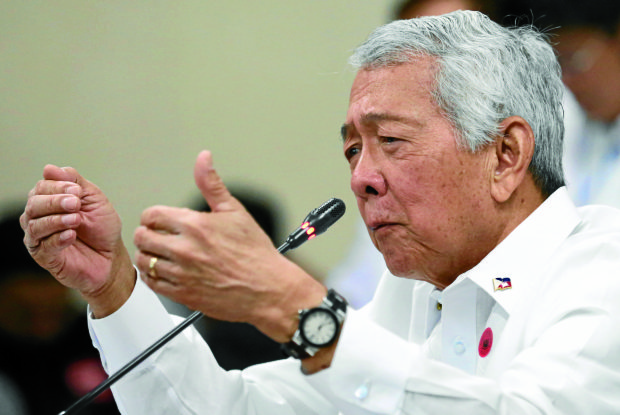
PERSONAL BELIEFS Foreign Secretary Perfecto Yasay tells senators about his personal beliefs on the South China Sea
conflict during his confirmation hearing at the Commission on Appointments. —JOAN BONDOC
Foreign Secretary Perfecto Yasay Jr. expressed doubt on Wednesday that a maritime dispute with China in the South China Sea could be resolved “during our lifetime,” so it was better to set it aside, engage Beijing and avoid an armed confrontation.
Defending President Rodrigo Duterte’s decision not to push China to abide by an international arbitration ruling that went in the Philippines’ favor last year, Yasay told lawmakers during his confirmation hearing that there was an impasse that neither side could break, so it was better to maximize benefits from Beijing instead.
During questioning by senators on the foreign affairs committee of the Commission on Appointments, Yasay said China’s stance and strategic objectives in the South China Sea meant a resolution was unlikely.
“I do not believe personally that this will be resolved soon. I believe that maybe perhaps it will not be resolved during our lifetime, but the option is not war, the option is not to engage ourselves in forcibly enforcing our claims,” Yasay said.
“I feel that the tact under the legal and diplomatic processes available to us is to set this aside. Maybe perhaps the future generation would probably be able to resolve this dispute,” he added.
Mr. Duterte has turned Philippine foreign policy upside down by making overtures to rival China to attract its trade, tourists and infrastructure investment.
Yasay said the new approach was to capitalize on a “convergence of our interests.”
Speaking to reporters after his hearing, Yasay said China and the Philippines should pursue “other broader and more important” aspects of their relations.
He insisted that the dispute between the two countries in the South China Sea was “not the sum total of our relationship.”
“Where our interests converge, we must be able to exploit that to the hilt for the mutual benefits of both countries,” he said.
Sovereignty question
Asked during the hearing if the Philippines owned the disputed islands, Yasay said that would have “no legal basis.”
He said the Permanent Court of Arbritration in The Hague ruled last July on what features fell within the Philippines’ 370-kilometer exclusive economic zone, but made no decision on sovereignty.
“Even as they have ruled in our favor overwhelmingly, this territory continues to be international waters,” he said.
“We have to prove it (ownership) in the appropriate international tribunal,” he added.
But he said the 21.6-km territorial sea of the Philippines was not in dispute and in the event of an encroachment by China, there would be a forceful defense, and support from the US military as guaranteed in the 1951 Mutual Defense Treaty with Washington.
“That will be the action where we will have to make sure we will be asserting ourselves, defending ourselves, even using force if necessary,” he said. —WITH A REPORT FROM THE WIRES

